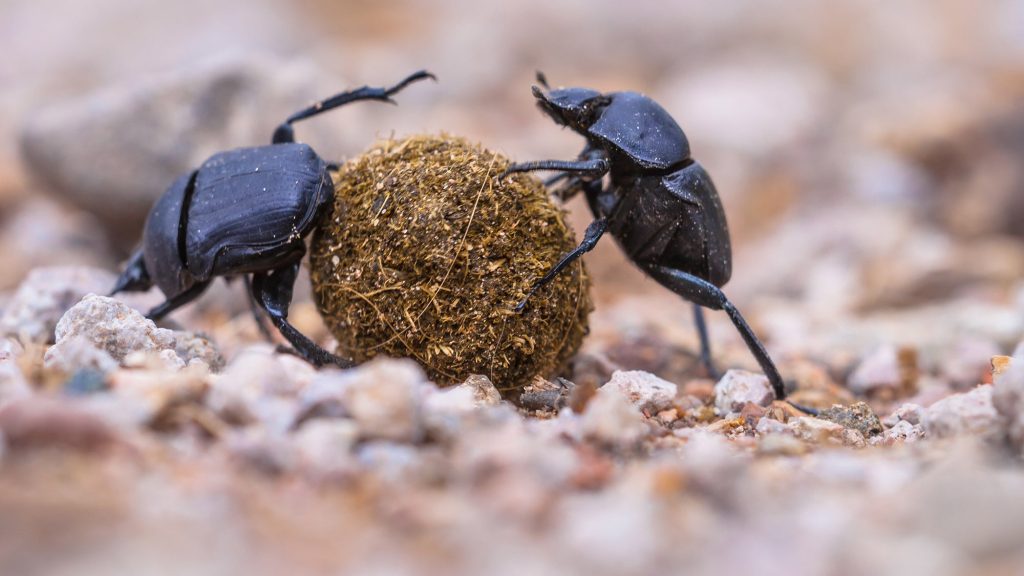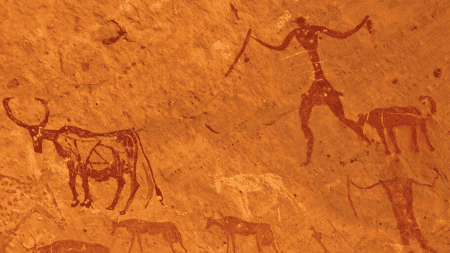What's the most unusual thing you've learned this week? Whatever it is, we assure you'll hear an even stranger response if you listen to PopSci’s hit podcast. The Weirdest Thing I Learned This Week hits Apple, Spotify, YouTube, and on all other podcast platforms every-other Wednesday morning. It is the new top source for the oddest science-related facts, figures, and interesting topics the editors of Popular Science can find. If you enjoy the stories in this post, we guarantee you'll enjoy the show.
Note: Rachel and Jess intend to do a live Q&A session soon, along with other entertaining extra content! Follow Rachel on Patreon and Jess on Twitch to stay updated.
FACT: Dung beetles use the Milky Way to steer their poop balls
Dung beetles may seem unimpressive, as they live in and feed off waste. However, they can perform remarkable physical feats, play an important ecological role, and even have an understanding of our position in the universe.
All dung beetles belong to the scarab family. The association of the word "scarab" with ancient Egypt is no coincidence. The ancient Egyptians observed these beetles rolling balls of dung and connected them to the sacred, dung-like orb of the sun, as well as ideas of renewal and rebirth.
In any land-based ecosystem, a fresh mound of waste is a complete world. Beetles consume dung, flies lay eggs, and other insects arrive to feed on the larvae of these creatures. It's a beautifully pungent circle of life.
It's also hazardous and fiercely competitive, which is why a particular group of dung beetles has a strategy for success: obtain some dung, shape it into a ball, and roll it far away. These balls can weigh 50 times their own weight, and they will transport them up to 200 meters before burying them underground.
However, before doing so, they perform a dance: the dung beetle hops onto their newly rolled dung ball and does one or more spins before pushing their valuable load to a secure hiding spot. This behavior likely aids these beetles in navigating to landmarks in the sky.This method may be a way for these beetles to avoid rolling in circles and ending up back where they began, in the midst of waste. Signals like the rising or setting sun, the wind, and polarized moonlight are utilized by dung beetles as cues for direction, without which they struggle to orient themselves and move in unsteady, circular paths.
For at least one nocturnal species, the primary clue on a moonless night appears to be our own Milky Way. In 2013, a scientific team took specimens of Scarabeus satyrus (and some dung) to a planetarium in Johannesburg, South Africa, and tested their navigation ability with and without a projection of our galaxy's well-known diffuse band of light. Surprisingly, the beetles navigated in a straight line—and struggled when given small cardboard hats to cover their eyes.
Later research indicated that these beetles use variations in brightness along the Milky Way, instead of individual groups of stars, to navigate. Other studies have discovered that these nighttime dung-carrying insects might be at risk from growing light pollution, because bright lights create confusing new landmarks and wash out the important differences in the Milky Way.
Why is it important if a beetle moves its excrement in a straight line? The success of dung beetles is crucial for effectively spreading animal waste in ecosystems by directly adding nutrients to the soil. There's a widely circulated claim on the internet that in certain parts of Texas, dung beetles bury 80 percent of cattle ranch manure–either way, these insects can definitely break down an individual cowpat. In doing so, they may help decrease methane and even CO2 emissions from livestock waste.
And by consuming and burying dung, they limit the opportunities for flies and other pests to reproduce–a lesson Australians learned when native dung beetles were not well-equipped to handle the influx of cows and sheep from colonizers. Luckily for Australians, a government initiative to introduce and promote cow feces-consuming beetles has been in place since the 1960s.
FACT: There’s a possibility that bananas could enhance the quality of beer
By Laura Baisas
Bananas might hold the key to a better beer. In 2022, a team of microbiologists in Belgium claimed they could enhance the flavor of modern beer by genetically modifying a type of yeast. They targeted a gene for a banana-like flavor, “because it is one of the most important flavors present in beer, as well as in other alcoholic beverages.” The history of brewing beer is an intriguing mix of science, cooking, and social dynamics, with with women serving as brewmasters for centuries. Tune in to this week’s episode to discover more!
FACT: Fictitious animals can aid in understanding how language evolves online–and how resistant people are to censorship
In recent years, people have started discussing a phenomenon often referred to as “algospeak.” This is where users of platforms like Instagram and TikTok create code words to help them evade algorithms that restrict or outright ban certain topics of discussion. However, this type of linguistic invention is not new. In fact, researchers have been studying a similar strategy among Chinese internet users for over a decade.
The quintessential example of this phenomenon is the discussion of a creature known as the “grass mud horse.” Despite having millions of results on Google, this creature is not real. Its name is a sort of homophone that only works in a tonal language like Mandarin or Cantonese. By changing tones, you transform cǎonímǎ—grass mud horse—into cào nǐ mā, which is a highly offensive insult. Discussing this fabricated animal (and a variety of other fictional species) enabled internet users to swear, talk about topics deemed taboo by the algorithm, and criticize government officials and their policies without risking censorship. You can view an excellent explanation of how this kind of wordplay functions here.
This has even led to seemingly random words being prohibited. For instance, the band name Hoobastank became a substitute for the censored word “tank,” and is now itself flagged!
Chinese social networking site Weibo has promised to take strong action against this type of evading censorship using wordplay. However, it seems like they have a challenging task ahead, as people continue to improve their use of clever wordplay. Plus other unusual things we found out this week.









